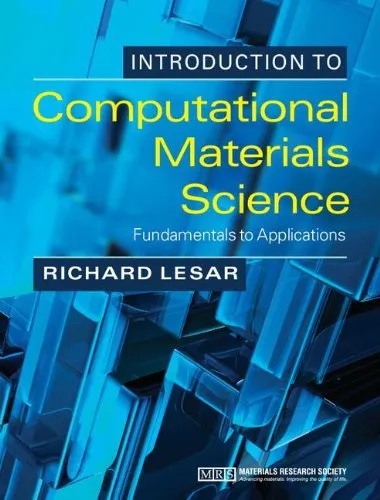Introduction to Computational Materials Science: Fundamentals to Applications
4.3
Reviews from our users

You Can Ask your questions from this book's AI after Login
Each download or ask from book AI costs 2 points. To earn more free points, please visit the Points Guide Page and complete some valuable actions.Introduction to Computational Materials Science: Fundamentals to Applications
"Introduction to Computational Materials Science: Fundamentals to Applications" is an essential text that bridges the gap between materials science theory and the computational tools needed to solve a diverse array of modern problems in the field. Authored by LeSar, the book is specifically designed for students, researchers, and industry professionals who aim to build a firm understanding of computational modeling methods as they apply to materials science disciplines.
This book effectively combines foundational knowledge with practical applications, providing readers with the tools they need to analyze material properties and behaviors using computational techniques. Whether you're new to computational materials science or seeking to deepen your expertise, this text serves as a comprehensive guide that balances theoretical rigor with practical insights.
Detailed Summary of the Book
The book is structured to guide readers through an extensive exploration of computational materials science, starting with its fundamental concepts and gradually progressing toward advanced methodologies and applications. The text begins by laying the groundwork, explaining basic principles in materials science that are essential for modeling and simulation. The introductory chapters also outline the significance of computational approaches in solving material-related challenges, emphasizing their real-world relevance.
The middle sections of the book delve deeply into various computational techniques, including density functional theory (DFT), molecular dynamics (MD), and Monte Carlo methods, among others. Each technique is thoroughly explained, with examples provided to illustrate their practical applications in materials science research. These chapters emphasize the connection between theory and practice, ensuring readers gain hands-on expertise in computational modeling and simulation.
Later chapters shift focus to advanced topics such as multiscale modeling, coarse-graining methodologies, and machine learning approaches in materials discovery. LeSar seamlessly integrates these cutting-edge areas to reflect the rapidly evolving research landscape in computational materials science. Additionally, the book presents case studies where computational models are used to predict material properties, investigate structural stability, and understand mechanisms like phase transitions and deformation behaviors.
Throughout the text, the author emphasizes reproducibility and accuracy, providing readers with practical insights on how to critically evaluate results and refine simulations. Clear explanations, accessible mathematics, and illustrative examples make this book a standout resource for both beginners and experienced practitioners in computational materials science.
Key Takeaways
- Comprehensive coverage of computational techniques like DFT, MD, and Monte Carlo methods.
- Detailed exposition of multiscale modeling and the integration of machine learning in materials research.
- Real-world examples and case studies to bridge the gap between theory and practical applications.
- Clear guidance on the strengths and limitations of various computational approaches.
- A focus on reproducibility, accuracy, and best practices for modern computational experiments.
Famous Quotes from the Book
"Materials science is no longer constrained by what can be done experimentally; computational materials science offers a window into the unseen world of materials and their behaviors."
"The power of computation lies not merely in solving problems at hand, but in uncovering the deeper meaning and hidden insights in material behavior."
Why This Book Matters
In the rapidly advancing field of materials science, computational methodologies serve as a critical cornerstone for innovation and discovery. This book addresses the growing need for comprehensive, accessible texts that emphasize both theory and application. By providing a clear roadmap for mastering computational approaches, the book equips readers with the ability to contribute to advancements in areas ranging from nanomaterials to biomaterials, energy solutions, and beyond.
What sets this book apart is its balanced approach to teaching—covering both the fundamentals for beginners and the advanced concepts sought by seasoned researchers. LeSar’s expertise shines in his ability to simplify complex topics while maintaining intellectual rigor. Whether you're an academic, an industry professional, or a student venturing into computational materials science, this book is an invaluable resource for advancing your understanding and skills.
Free Direct Download
You Can Download this book after Login
Accessing books through legal platforms and public libraries not only supports the rights of authors and publishers but also contributes to the sustainability of reading culture. Before downloading, please take a moment to consider these options.
Find this book on other platforms:
WorldCat helps you find books in libraries worldwide.
See ratings, reviews, and discussions on Goodreads.
Find and buy rare or used books on AbeBooks.
1199
بازدید4.3
امتیاز50
نظر98%
رضایتReviews:
4.3
Based on 0 users review
"کیفیت چاپ عالی بود، خیلی راضیام"


